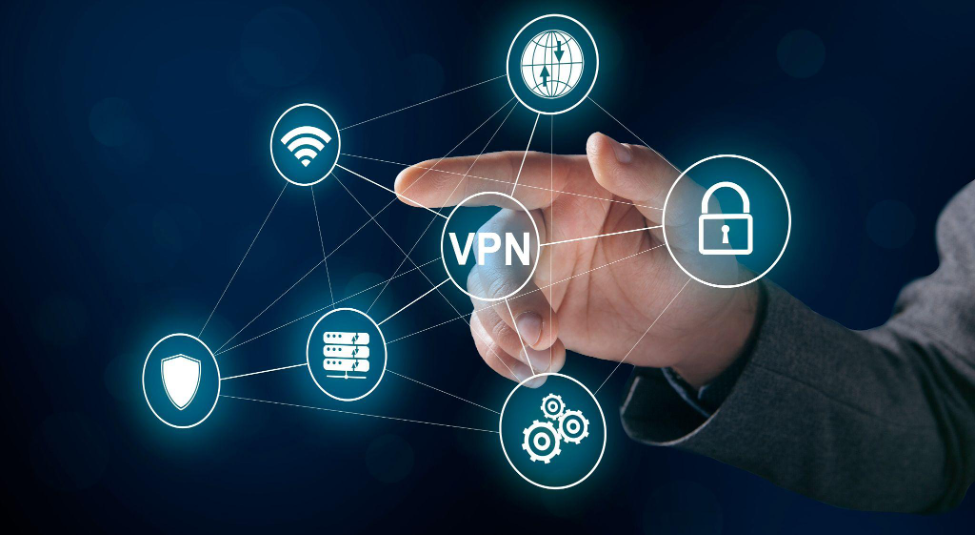In today’s cybersecurity landscape, businesses must prioritize their security measures due to the constant emergence of dangerous and damaging risks, many of which are aligned with enterprise technology trends.
For modern businesses, VPNs are vital in ensuring remote work and network security for businesses.
Consider the increasing prevalence of remote working. According to Global Workplace Analytics, there are now 4.3 million workers who operate from home or other locations outside the traditional office for at least half their working time. Additionally, around 50% of the entire American workforce has job roles that are suitable for partial teleworking, and a significant majority of employees (over 90%) express a desire to have the option to work from home part-time.
However, as more employees work remotely, concerns arise regarding their access to sensitive company data and tools. Without a completely secure connection that eliminates the risks of cyber snooping and unauthorized access, remote employees become potential sources of digital security threats for their employers.
This is where a secure VPN for business comes into play as an advanced solution for safeguarding remote employees. Let’s delve deeper into this technology, exploring how VPNs work, the most common VPN protocols, and which ones are ideal for businesses.
How Does a VPN Work?
Contents
VPNs establish a secure and encrypted connection between two endpoints. The two endpoints generate a shared encryption key before establishing the VPN connection. This can be achieved by assigning a password to the user or utilizing a key-sharing algorithm.
Once the encryption key is shared, it encrypts all data transmitted over the VPN link.
For instance, when a client machine sends data, it encrypts the information and sends it to the other VPN endpoint. The data is decrypted and forwarded to its intended destination at that location. When the destination server responds, the entire process is reversed, with the response being encrypted, sent to the client machine, decrypted, and presented to the user.
A secure VPN for businesses caters to the needs of businesses. Its primary purpose was to offer secure, cost-effective, and flexible solutions for safeguarding corporate networks. Employees can access work tools and data through a VPN, while unauthorized individuals are restricted from entering.
Instead of relying on expensive hardware to establish isolated networks, a VPN connection utilizes the open internet to transmit data securely through an encrypted tunnel. As the internet is inherently public, encryption is a deterrent against unauthorized individuals operating within the same environment.
While VPN technology is not inherently complex, numerous VPN setups and tunneling protocols exist. This abundance of options can be overwhelming, so here’s a brief overview of the VPN types and tunneling protocols suitable for your business.

How to know if a business VPN is safe?
Virtual Private Networks (VPNs) utilize various tunneling protocols to define how data is sent. These protocols dictate the packaging and checks performed upon reaching their destination. The choice of protocol impacts speed and security.
Here are some standard VPN protocols.
Layer 2 Tunneling Protocol (L2TP)
L2TP establishes a secure tunnel between two connection points and uses an additional tunneling protocol, such as IPSec, to encrypt the transmitted data. Its intricate architecture ensures high security for data exchange. L2TP is another popular choice for site-to-site setups, particularly when increased security is required.
Internet Protocol Security (IPSec)
IPSec is a VPN tunneling protocol that ensures data security through session authentication and encryption of data packets. It employs double encryption with the encrypted message. IPSec is a standard protocol in site-to-site VPN configurations due to its high compatibility.
SSL and TLS
Secure Socket Layer (SSL) and Transport Layer Security (TLS) protocols encrypt HTTPS web pages. They allow limited user access to specific applications, with web browsers acting as clients. Most browsers support SSL and TLS connections. SSL/TLS is employed in remote access VPNs, typically.
Point-to-Point Tunneling Protocol (PPTP)
PPTP is a tunneling protocol that creates a tunnel using the PPTP cipher. However, due to advancements in computing power, the PPTP cipher is susceptible to brute-force attacks and is no longer widely used. More secure tunneling protocols with advanced encryption have replaced it.
OpenVPN
OpenVPN is an open-source SSL/TLS framework enhancement incorporating additional cryptographic algorithms to ensure a highly secure encrypted tunnel. It is renowned for its robust security and efficiency. However, compatibility and setup may vary, as it cannot be installed natively on all devices for router-to-router VPN networks. OpenVPN offers User Datagram Protocol (UDP) and Transmission Control Protocol (TCP) versions. UDP provides faster speeds by reducing data checks, while TCP offers better data integrity protection. OpenVPN is widely used for both remote access and Site-to-site VPN applications.
Wireguard
Wireguard is a new tunneling protocol that offers simplified implementation, superior efficiency, and enhanced security compared to IPSec and OpenVPN. It utilizes streamlined code to deliver optimal performance. Some offices employ Wireguard for site-to-site connections. Proprietary implementations exist.
Secure Shell (SSH)
SSH establishes an encrypted connection and allows port forwarding to remote machines through a secure channel. In addition, SSH channels are closely monitored as they create a direct entry point and require careful oversight. SSH is suitable for remote access setups.
Is it safe to use a VPN for business?
Several key factors need to be considered when assessing the safety of a business VPN (Virtual Private Network). Firstly, it is crucial to evaluate the reputation and track record of the VPN provider. Look for well-established and reputable companies with a history of providing reliable and secure VPN services. Additionally, consider the jurisdiction where the VPN provider operates, as different countries have varying data privacy laws and regulations. Opting for a provider based in a country with strong privacy protections can be advantageous.
Another crucial aspect to examine is the VPN’s security features. A safe business VPN should offer robust encryption protocols, such as AES-256, ensuring your data remains secure and protected from potential eavesdropping or interception. Furthermore, the VPN should have a clear and transparent logging policy. Ideally, it should have a strict no-logs policy, meaning it does not collect or store any user activity logs that could be accessed or compromised.
A reliable business VPN should also have robust authentication mechanisms like multi-factor authentication, to prevent unauthorized access. It should offer a variety of VPN server locations, allowing businesses to choose servers located in countries where they conduct their operations. This enhances security, helps bypass geo-restrictions, and enables accessing region-specific content.
Lastly, reviewing user feedback and independent security audits or assessments of the VPN service is essential. Look for any reported security vulnerabilities or incidents and any positive testimonials from businesses or individuals using the service. Conducting thorough research and due diligence before choosing a business VPN provider will help ensure your organization’s data and communications are protected safely and reliably.

Which VPN Is Ideal for Your Business?
When selecting a VPN for your business, it should be the last consideration on your list. The first step is determining the type of setup you need: remote access. This initial decision will help narrow down your options. However, it’s important to note that other possibilities exist for setting up an Internet-based VPN beyond remote access.
Once you have identified your business requirements and chosen the appropriate setup method, you can assess your network needs. Consider your risk model, expected traffic load, data accessibility requirements, and authorized users. The clearer your understanding of these aspects, the better equipped you’ll be to optimize setup costs and select the most suitable tunneling protocol for your specific situation.
As a general guideline, Wireguard, L2TP, SSL/TLS, and OpenVPN are among the safest options for remote access setups. Choosing the best VPN protocols may depend on the hardware you already have. For instance, if your routers support OpenVPN natively, it might be more practical to use them rather than replacing them solely to accommodate Wireguard.
PureDome is a comprehensive corporate VPN solution that boosts business efficiency by enhancing data security and streamlining management by utilizing multiple tunneling protocols, including the advanced and highly secure Wireguard.
Get in touch with us to learn more about how PureDome can help your business with network security.


